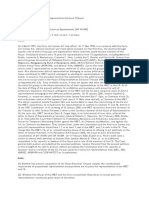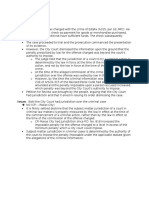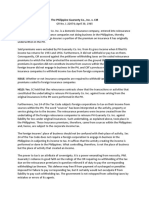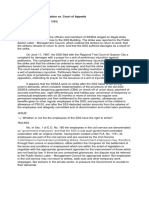Lutz Vs Araneta
Lutz Vs Araneta
Uploaded by
Lizzy WayCopyright:
Available Formats
Lutz Vs Araneta
Lutz Vs Araneta
Uploaded by
Lizzy WayOriginal Description:
Original Title
Copyright
Available Formats
Share this document
Did you find this document useful?
Is this content inappropriate?
Copyright:
Available Formats
Lutz Vs Araneta
Lutz Vs Araneta
Uploaded by
Lizzy WayCopyright:
Available Formats
Title: WALTER LUTZ, vs. J.
ANTONIO ARANETA
Facts:
This case was initiated to test the legality of the taxes imposed by the Sugar Adjustment Act
(Commonwealth Act No. 567) which sought "to obtain a readjustment of the benefits derived
from the sugar industry by the component elements thereof" and "to stabilize the sugar
industry…”
Petitioner, in his capacity as Judicial Administrator of the Intestate Estate of Antonio Jayme
Ledesma, seeks to recover from the CIR the sum of P14,666.40 paid by the estate as taxes,
under section 3 of the Act, for the crop years 1948-1949 and 1949-1950. He alleges that sec. 3
of the law is unconstitutional and void as it levies tax for the aid and support of the sugar
industry exclusively, which is not for a public purpose for which tax may be constitutionally
levied upon.
The case was dismissed by the CFI and was raised directly to the SC on appeal
Issue: WON the tax imposed by Commonwealth Act No. 567 is constitutional and valid
Ruling: Yes
The tax provided for in Commonwealth Act No. 567 is not a pure exercise of the taxing power.
The law shows that the tax is levied with a regulatory purpose, to provide means for the
rehabilitation and stabilization of the threatened sugar industry. In other words, the act is
primarily an exercise of the police power.
The court further noted that the tax provided for in Commonwealth Act No. 567 that sugar
production is one of the great industries of our nation, sugar occupying a leading position
among its export products; that it gives employment to thousands of laborers in fields and
factories; that it is a great source of the state's wealth, is one of the important sources of foreign
exchange needed by our government, and is thus pivotal in the plans of a regime committed to
a policy of currency stability. Its promotion, protection and advancement, therefore redounds
greatly to the general welfare. Hence it was competent for the legislature to find that the general
welfare demanded that the sugar industry should be stabilized in turn; and in the wide field of its
police power, the lawmaking body could provide that the distribution of benefits therefrom be
readjusted among its components to enable it to resist the added strain of the increase in taxes
that it had to sustain.
You might also like
- Phantom of The OperaDocument18 pagesPhantom of The OperaLizzy Way100% (1)
- CIR V SantosDocument1 pageCIR V SantosLizzy Way100% (1)
- People of The Philippines v. Sandiganbayan, Et Al. (712 SCRA 359, 2013)Document2 pagesPeople of The Philippines v. Sandiganbayan, Et Al. (712 SCRA 359, 2013)Earvin James AtienzaNo ratings yet
- Intellectual Property Code (RA No. 8293)Document8 pagesIntellectual Property Code (RA No. 8293)Lizzy WayNo ratings yet
- 2004 Rules On Notarial PracticeDocument14 pages2004 Rules On Notarial PracticeLizzy Way100% (7)
- CIR Vs Eastern TelecommunicationsDocument1 pageCIR Vs Eastern TelecommunicationsLizzy WayNo ratings yet
- Lutz v. Araneta, GR No. L-7859 12-22-1955Document1 pageLutz v. Araneta, GR No. L-7859 12-22-1955James Gaddao100% (1)
- Almario Vs Executive Sec.Document19 pagesAlmario Vs Executive Sec.chakura0912No ratings yet
- 4-9 (Formilleza Up To Deloso)Document4 pages4-9 (Formilleza Up To Deloso)nchlrysNo ratings yet
- Re - Petition For Radio and Television Coverage of The Multiple Murder Cases Against Maguindanao Governor Zaldy Ampatuan, A.M. No. 10-11-5-SC, Etc, June 14, 2011.Document2 pagesRe - Petition For Radio and Television Coverage of The Multiple Murder Cases Against Maguindanao Governor Zaldy Ampatuan, A.M. No. 10-11-5-SC, Etc, June 14, 2011.Rizchelle Sampang-ManaogNo ratings yet
- In Re Rodulfo ManzanoDocument8 pagesIn Re Rodulfo ManzanoSar FifthNo ratings yet
- Pimentel V HRETDocument2 pagesPimentel V HRETjbaxx5No ratings yet
- Gamboa Vs Teves 2012Document1 pageGamboa Vs Teves 2012Hoven MacasinagNo ratings yet
- 06 Dadubo - v. - Civil - Service - CommissionDocument6 pages06 Dadubo - v. - Civil - Service - CommissioncelNo ratings yet
- People V LagonDocument1 pagePeople V LagonSocNo ratings yet
- Case 1Document7 pagesCase 1Jefferson A. dela CruzNo ratings yet
- 182-General Milling Corporation v. Viajar G. R. No. 181738 January 30, 2013Document7 pages182-General Milling Corporation v. Viajar G. R. No. 181738 January 30, 2013Jopan SJNo ratings yet
- RP vs. IAC, Et Al., G.R. No. 71176, May 21, 1990Document4 pagesRP vs. IAC, Et Al., G.R. No. 71176, May 21, 1990John Edward Kenneth Macawili RagazaNo ratings yet
- Soliven V MakasiarDocument1 pageSoliven V MakasiarJJ OhNo ratings yet
- Cir VS San MiguelDocument2 pagesCir VS San MiguelJan EchonNo ratings yet
- Case Digest 2Document4 pagesCase Digest 2ronaldsatorre.15No ratings yet
- City of Marikina PDFDocument18 pagesCity of Marikina PDFLynNo ratings yet
- Abakada Guro Party List Vs Executive Secretary G.R. No. 168056 September 1, 2005 FactsDocument1 pageAbakada Guro Party List Vs Executive Secretary G.R. No. 168056 September 1, 2005 FactsKathleneGabrielAzasHaoNo ratings yet
- Salazar V People (De Los Reyes) (With Watermark) B2021Document2 pagesSalazar V People (De Los Reyes) (With Watermark) B2021Abegail GaledoNo ratings yet
- Whitelight Corporation vs. City of Manila 576 SCRA 416 (2009)Document16 pagesWhitelight Corporation vs. City of Manila 576 SCRA 416 (2009)Harold Q. GardonNo ratings yet
- Garcia vs. Executive Secretary 677 SCRA 750 - DigestDocument1 pageGarcia vs. Executive Secretary 677 SCRA 750 - DigestMerriam Leirose Daganta Cabidog100% (1)
- Pepsi v. TanauanDocument2 pagesPepsi v. TanauanKhian JamerNo ratings yet
- Due Process 1. Cruz vs. Civil Service CommissionDocument7 pagesDue Process 1. Cruz vs. Civil Service Commissionchiiwapanda yangNo ratings yet
- Nobleza V NuegaDocument2 pagesNobleza V NuegaReMjellHumarangNo ratings yet
- Provi Vs Tesda DigestDocument2 pagesProvi Vs Tesda DigestJulian DubaNo ratings yet
- $ Upreme Lrourt: 3&.epuhlic of Tbe Bilippineg FflanilaDocument6 pages$ Upreme Lrourt: 3&.epuhlic of Tbe Bilippineg FflanilawupwupwupNo ratings yet
- (DIGEST) Whitelight Corporation vs. City of Manila 576 SCRA 416 (2009)Document1 page(DIGEST) Whitelight Corporation vs. City of Manila 576 SCRA 416 (2009)Harold Q. GardonNo ratings yet
- Ormoc Sugar Company vs. Ormoc CityDocument1 pageOrmoc Sugar Company vs. Ormoc CityBam BathanNo ratings yet
- Cornelio (Freedom of Expression)Document4 pagesCornelio (Freedom of Expression)Isdalicious100% (1)
- Soliven v. MakasiarDocument2 pagesSoliven v. MakasiarElaine Belle OgayonNo ratings yet
- Maria Carolina P. Araullo Et. AlDocument3 pagesMaria Carolina P. Araullo Et. AlClaire SilvestreNo ratings yet
- Social Justice Society v. Atienza, JR., G.R. No. 156052, March 7, 2007Document10 pagesSocial Justice Society v. Atienza, JR., G.R. No. 156052, March 7, 2007FD BalitaNo ratings yet
- Legisltive Power To The Governor-GeneralDocument1 pageLegisltive Power To The Governor-Generalasl_5074No ratings yet
- People Vs MojelloDocument9 pagesPeople Vs MojelloOlek Dela CruzNo ratings yet
- People Vs Bolanos 211 SCRA 262Document3 pagesPeople Vs Bolanos 211 SCRA 262MWinbee VisitacionNo ratings yet
- Association of Small Landowners Vs Secretary of DARDocument2 pagesAssociation of Small Landowners Vs Secretary of DARDaryl GamuzaNo ratings yet
- Article 7 Section 19 Sabello V Department of EducationDocument5 pagesArticle 7 Section 19 Sabello V Department of EducationOdessa Ebol Alpay - QuinalayoNo ratings yet
- Philippine Society V. CoaDocument2 pagesPhilippine Society V. CoaAndrea RioNo ratings yet
- Abayon Vs HRET, Palparan Vs HRET, GR Nos. 189466 & 189506Document6 pagesAbayon Vs HRET, Palparan Vs HRET, GR Nos. 189466 & 189506AddAllNo ratings yet
- The Philippine Guaranty Co., Inc. v. CIRDocument1 pageThe Philippine Guaranty Co., Inc. v. CIRMary BoaquiñaNo ratings yet
- CIR V Bishop of Missionary DistrictDocument7 pagesCIR V Bishop of Missionary Districtnichols greenNo ratings yet
- Van Dorn Vs Romillo JR 139 SCRA 159Document3 pagesVan Dorn Vs Romillo JR 139 SCRA 159certiorari19No ratings yet
- Lyons V US DigestDocument2 pagesLyons V US DigestEmrys PendragonNo ratings yet
- The Instant Case Is Hereby DISMISSED For Lack of MeritDocument1 pageThe Instant Case Is Hereby DISMISSED For Lack of MeritSORITA LAWNo ratings yet
- G.R. No. 223395, December 04, 2018Document39 pagesG.R. No. 223395, December 04, 2018Kristine MagbojosNo ratings yet
- Title: MMDA v. Dante Garin Date: April 15, 2005 Petitioner: MMDA Respondent: Dante Garin Ponente: Chico-Nazario, J. FactsDocument1 pageTitle: MMDA v. Dante Garin Date: April 15, 2005 Petitioner: MMDA Respondent: Dante Garin Ponente: Chico-Nazario, J. FactsMari YatcoNo ratings yet
- Marquez VsDocument12 pagesMarquez VsD Del SalNo ratings yet
- Lacap, Etc. Case DigestDocument4 pagesLacap, Etc. Case DigestJewel Ivy Balabag DumapiasNo ratings yet
- Dormal Vs SandigabayanDocument2 pagesDormal Vs SandigabayanCarlota Nicolas VillaromanNo ratings yet
- Jurisprudence March 2014Document5 pagesJurisprudence March 2014herbs22225847100% (1)
- Case Digest ReswriDocument4 pagesCase Digest ReswriBenedick LedesmaNo ratings yet
- Taxation Digests-3Rd Batch: 1 - PageDocument6 pagesTaxation Digests-3Rd Batch: 1 - PageAdrianAdriaticoNo ratings yet
- Sps. Guanio V. Makati Shangri-La Hotel GR No. 190601, February 7 2011 FactsDocument14 pagesSps. Guanio V. Makati Shangri-La Hotel GR No. 190601, February 7 2011 FactsAnonymous UzSUnkNo ratings yet
- Ormoc Sugar Co., Inc. vs. Treasurer of Ormoc City, 22 SCRA 603, February 17, 1968Document6 pagesOrmoc Sugar Co., Inc. vs. Treasurer of Ormoc City, 22 SCRA 603, February 17, 1968milkteaNo ratings yet
- Adong-vs-Cheong-Seng-Gee-DoysabasDocument1 pageAdong-vs-Cheong-Seng-Gee-DoysabasFranzMordenoNo ratings yet
- j14. Sss Employees Association V CADocument1 pagej14. Sss Employees Association V CAAnonymoussssssNo ratings yet
- Plaintiff, Criminal Case No. 11466: Accused. X - XDocument2 pagesPlaintiff, Criminal Case No. 11466: Accused. X - XFely DesembranaNo ratings yet
- Philippine Telegraph and Telephone CoDocument2 pagesPhilippine Telegraph and Telephone CoAllen Windel Bernabe50% (2)
- Lutz vs. Araneta, G.R. No. L-7859Document1 pageLutz vs. Araneta, G.R. No. L-7859alyza burdeosNo ratings yet
- Lutz vs. Araneta, G.R. No. L-7859Document1 pageLutz vs. Araneta, G.R. No. L-7859alyza burdeosNo ratings yet
- Winebrenner Inigo Insurance Brokers Inc vs. CIRDocument1 pageWinebrenner Inigo Insurance Brokers Inc vs. CIRLizzy WayNo ratings yet
- CIR-vs-Isabela-Cultural-CorpDocument1 pageCIR-vs-Isabela-Cultural-CorpLizzy WayNo ratings yet
- MERALCO, Et Al. Vs LimDocument2 pagesMERALCO, Et Al. Vs LimLizzy WayNo ratings yet
- Arches v. BellosilloDocument1 pageArches v. BellosilloLizzy WayNo ratings yet
- Duty Free v. COADocument1 pageDuty Free v. COALizzy Way100% (1)
- Basilan Estates vs. CirDocument1 pageBasilan Estates vs. CirLizzy WayNo ratings yet
- Electronic Commerce Act (RA No. 8792)Document2 pagesElectronic Commerce Act (RA No. 8792)Lizzy WayNo ratings yet
- Medicard v. CirDocument1 pageMedicard v. CirLizzy WayNo ratings yet
- Abakada Guro Party List Vs Ermita GR 168056Document1 pageAbakada Guro Party List Vs Ermita GR 168056Lizzy WayNo ratings yet
- Mendez Vs People 726 SCRA 203 (2014)Document1 pageMendez Vs People 726 SCRA 203 (2014)Lizzy WayNo ratings yet
- Sy Po Vs CTADocument1 pageSy Po Vs CTALizzy WayNo ratings yet
- Tan Tiong Bio vs. CIR, G.R. No. L-15778, April 23, 1962Document1 pageTan Tiong Bio vs. CIR, G.R. No. L-15778, April 23, 1962Lizzy WayNo ratings yet
- Data Privacy Act (RA No. 10173)Document4 pagesData Privacy Act (RA No. 10173)Lizzy WayNo ratings yet
- Lorenzo vs. Posadas Jr.Document2 pagesLorenzo vs. Posadas Jr.Lizzy Way100% (1)
- PLDT Vs City of BacolodDocument1 pagePLDT Vs City of BacolodLizzy Way100% (1)
- Paseo Realty and Development CorpDocument1 pagePaseo Realty and Development CorpLizzy WayNo ratings yet
- ABAKADA Guro vs. Ermita, 469 SCRA 14Document2 pagesABAKADA Guro vs. Ermita, 469 SCRA 14Lizzy WayNo ratings yet
- Holy Sonnets - Batter My Heart, Three Person'd GodDocument11 pagesHoly Sonnets - Batter My Heart, Three Person'd GodLizzy WayNo ratings yet
- Sarasola v. Trinidad, 40 Phil. 252Document1 pageSarasola v. Trinidad, 40 Phil. 252Lizzy Way100% (1)



















































































